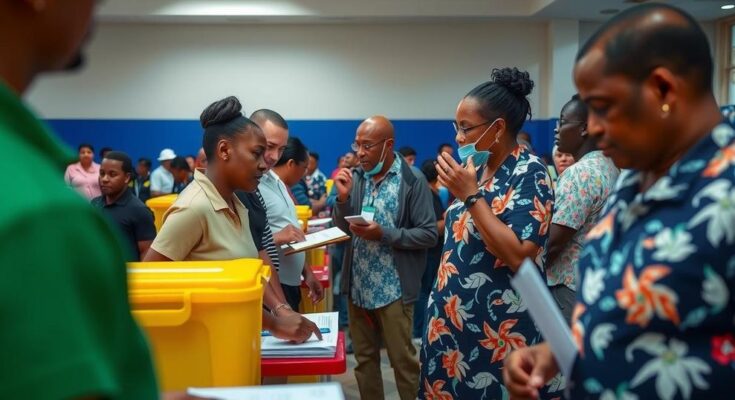Mauritius held parliamentary elections focusing on a cost of living crisis, with Prime Minister Jugnauth and rivals promising reforms. Polling revealed citizens’ desire for economic innovation and job opportunities. Conflicts around social media bans ahead of the election raised public concerns. The results will determine the future course of the nation amidst pressing economic issues.
On Sunday, Mauritius conducted parliamentary elections as citizens grappled with a prevalent cost of living crisis. Premier Pravind Kumar Jugnauth and his opponents made pledges to address economic concerns amidst voter dissatisfaction with current fiscal conditions. While polling began early in the day, voters expressed the need for innovative economic solutions and employment opportunities beyond merely fiscal changes. The election, which anticipated a turnout of over a million voters for the 62 parliamentary seats from a slate of 68 parties and five political alliances, revealed a political landscape focused on economic stability. Jugnauth’s Alliance Lepep coalition seeks to raise wages, increase pensions, and lower VAT on essential items utilizing payments from the UK in an agreement regarding the Chagos Islands. Political analyst Subash Gobine noted, “The alliance led by the prime minister is selling the economic prosperity card, with promises of more money to different segments of the population.” The opposition coalition, Alliance du Changement, led by Navin Ramgoolam, also promises pension increases and initiatives for free transport and internet services, demonstrating a competitive political environment. Meanwhile, last week’s temporary ban of social media platforms by Jugnauth’s government, just before the elections, raised concerns over national security and public information access, which was subsequently lifted after criticism from opposition figures. The outcome of this election could significantly reshape Mauritius’ political landscape, especially as young voters emphasize the necessity for jobs and economic innovation in their choices, signaling a need for the elected government to address these pressing issues effectively.
Mauritius, an island nation in the Indian Ocean, serves as a strategic link between Africa and Asia, with its economy largely supported by offshore financial services, tourism, and textile industries. As it approaches parliamentary elections in a challenging economic climate, many citizens are dissatisfied with the current government’s handling of inflation and wage stagnation. Both major political coalitions are prioritizing promises related to cost of living adjustments as ongoing global economic pressures impact local populations. The political stakes are high, with the election potentially affecting governance and the direction of economic policy in Mauritius for the next five years.
In summary, the parliamentary elections in Mauritius highlight crucial economic concerns regarding cost of living and job creation that dominate voter sentiment. With promises from both the governing and opposition parties focusing on wage and pension reforms, the electorate is poised to influence the future direction of the nation. The shift in political power could herald significant changes in governance and economic management, reflective of the urgent needs of the populace as they seek more sustainable solutions to their challenges.
Original Source: www.sowetanlive.co.za




